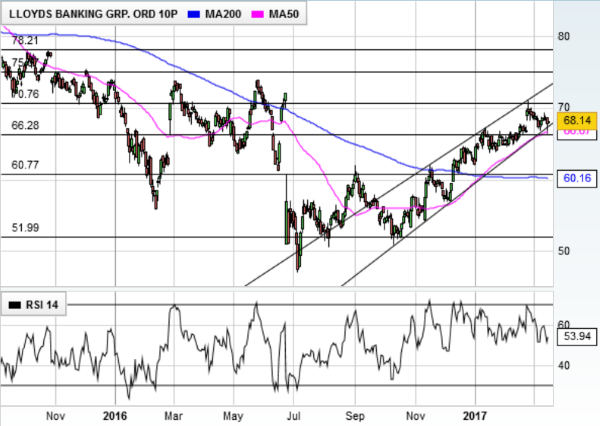More share selling at Lloyds Banking Group
15th March 2017 11:31
by Lee Wild from interactive investor
Philip Hammond was heavily criticised for his Budget raid on the self-employed via a hike in national insurance contributions (NICs). Breaking a manifesto promise would net the chancellor about £2 billion to spend on social services and elsewhere.
But Hammond has been forced into a humiliating climbdown Wednesday, scrapping the NICs rise for the self-employed. Thankfully, the Treasury will be able to tell the embarrassed chancellor he's just received a separate windfall of a similar amount, which will help repair the country's balance sheet.
We're told today that the UK Financial Investments (UKFI) told Morgan Stanley to sell over 671 million shares on Tuesday. We don't know what price they got, but it wouldn't have been any less than 66.5p, trousering over £446 million.
That leaves the government with a smidge more than 2.1 billion shares left, about 2.95% of the company worth around £1.4 billion at current prices. When Gordon Brown ordered a bail-out of the lender in 2008, the government was left with a 43% stake.
According to Treasury stats, and factoring in dividends received, the taxpayer has now recovered £19.5 billion of the £20.3 billion used to save Lloyds during the credit crunch.
"Lloyds' recent annual results show that we are in a good position to reduce our shareholding further and expect to recover all of the money taxpayers injected into the bank during the financial crisis," said Simon Kirby, economic secretary to the Treasury.

After the Brexit vote forced former prime minister David Cameron to scrap a planned share offer to retail investors last summer, the UKFI has been a happy seller. And it's been a regular trader in 2017, netting an estimated £1.9 billion.
Three weeks ago it sold 791 million shares on the day that Lloyds moved above 70p for the first time since the EU referendum on 23 June. A month earlier it sold 676.5 million at around 66p, less than a month before full-year results.
And on 6 January, the Treasury offloaded 700 million Lloyds shares to take its holding below 6%, which meant it was no longer the bank's largest shareholder.
Lloyds has been the best-performing of the big listed banks in the past month, and rose as much as 1% Wednesday. In fact, it's the only one in positive territory, and only Standard Chartered has done better in 2017.
Despite decent results, and a return to the dividend list, it's impossible to imagine the government will sell its remaining shares for anything like the 80p it managed in early 2015.
However, a full exit will come as a huge relief to both politicians and investors alike. There have been significant operating issues keeping a lid on Lloyds' share price, but an overhang created by the government's holding hasn't helped.
While clearing the overhang is good news, Lloyds is unlikely to make much meaningful progress until interest rates – a significant aid to bank margins – begin to rise. At least that dividend should keep shareholders happy until they do.
This article is for information and discussion purposes only and does not form a recommendation to invest or otherwise. The value of an investment may fall. The investments referred to in this article may not be suitable for all investors, and if in doubt, an investor should seek advice from a qualified investment adviser.